Bluegrass Area Development District serves 17 communities
By Terri Darr McLean
LEXINGTON, Ky. (Dec. 15, 2014) — When Bourbon County needed a body cooler for its morgue, Leann Lacy went to bat to help secure the necessary funds. When Perryville Fire Department needed a thermal imaging camera for its firefighters, she again stepped up to the plate.
 As a community development specialist for Bluegrass Area Development District, its Lacy’s job to help communities in the 17-county district find and acquire funding for critical needs. And though she still considers herself a rookie after only one year on the job, she’s already batting nearly a thousand.
As a community development specialist for Bluegrass Area Development District, its Lacy’s job to help communities in the 17-county district find and acquire funding for critical needs. And though she still considers herself a rookie after only one year on the job, she’s already batting nearly a thousand.
Lacy learned recently that all but two homeland security grants she applied for on behalf of several communities had been approved. Those grants totaled more than $78,000 and will be used to buy equipment aimed at strengthening emergency response readiness.
“Overall, this will make our district safer,” Lacy said. “These people – police officers, firefighters – are very busy. It’s our role to try to take that worry off their plate and get them the equipment they need to stay effective.”
Helping communities find funding for critical equipment, infrastructure, capital improvements and more is, indeed, a key service of all Area Development Districts. For Bluegrass ADD, Lacy is one of three community development specialists who research, write and administer grants to do just that.
“It’s very exciting, I think, because we know that for each grant we’re successful in getting, we’re helping a community with a special need they have. We know because of that, they don’t have to worry about it in their day-to-day operation,” she said.
Often, city and county officials do not have the staff to write the grants. But just as often they don’t know where to look for them.
“Just knowing which grant fits your need is half the battle,” Lacy said. “We tell them if you have anything you know you need, let us know and we’ll try to apply.”
Lacy said the community development specialists at Bluegrass ADD will also write and administer the grants as part of the service they provide. And, when possible, they “plead the case.”
“I’m not sure all grant writers get that personal, but I do,” she laughed. “You do feel like you’re up to bat for them. You do feel that they obviously need this or they wouldn’t be coming to you for your help. You’re almost speaking for them – at least conveying how bad they need something.”
For this latest round of homeland security grants, which Lacy worked on for most of her first year on the job, she applied for and received three different types.
Four of six Kentucky Office of Homeland Security grants were awarded, totaling $78,000. The grants will provide backup generators, repeaters, warning sirens, body coolers, and defibrillators for Boyle, Harrison, Lincoln and Scott counties.
The “biggest sweep” of grants were Commercial Mobile Radio Services grants – $653,000 worth. Those funds will be used primarily for computer aided dispatch systems but also for 9-1-1 recorders and even some furnishings for 9-1-1 offices. Franklin, Jessamine, Powell and Woodford counties, as well as the Harrodsburg Police Department are the beneficiaries of those grants.
Lastly, the district received more than $106,526 from FEMA to produce a hazard mitigation plan for all 17 counties in the Bluegrass ADD. The plan deals with such hazards as chemical spills, earthquakes, landslides, tornadoes, biohazards, flooding and more.
“The plan will come out in 2016, so we have a couple of years to conduct meetings with these local communities and talk with stakeholders … to identify changes to the current plan and update it,” Lacy said. “This grant basically funds us to go out and conduct these meetings to get the information we need to update the plan.”
Lacy, who studied anthropology as an undergraduate and got a master’s in public administration, never imagined that she would play an integral part in helping communities in this way. But after seeing her hometown of West Liberty nearly destroyed by a tornado in 2012, she said she wouldn’t have it any other way.
“I feel like I know what a generator would mean to a community because I was there after the tornado. … I realize how important these grants really are,” she said.




















Add Comment